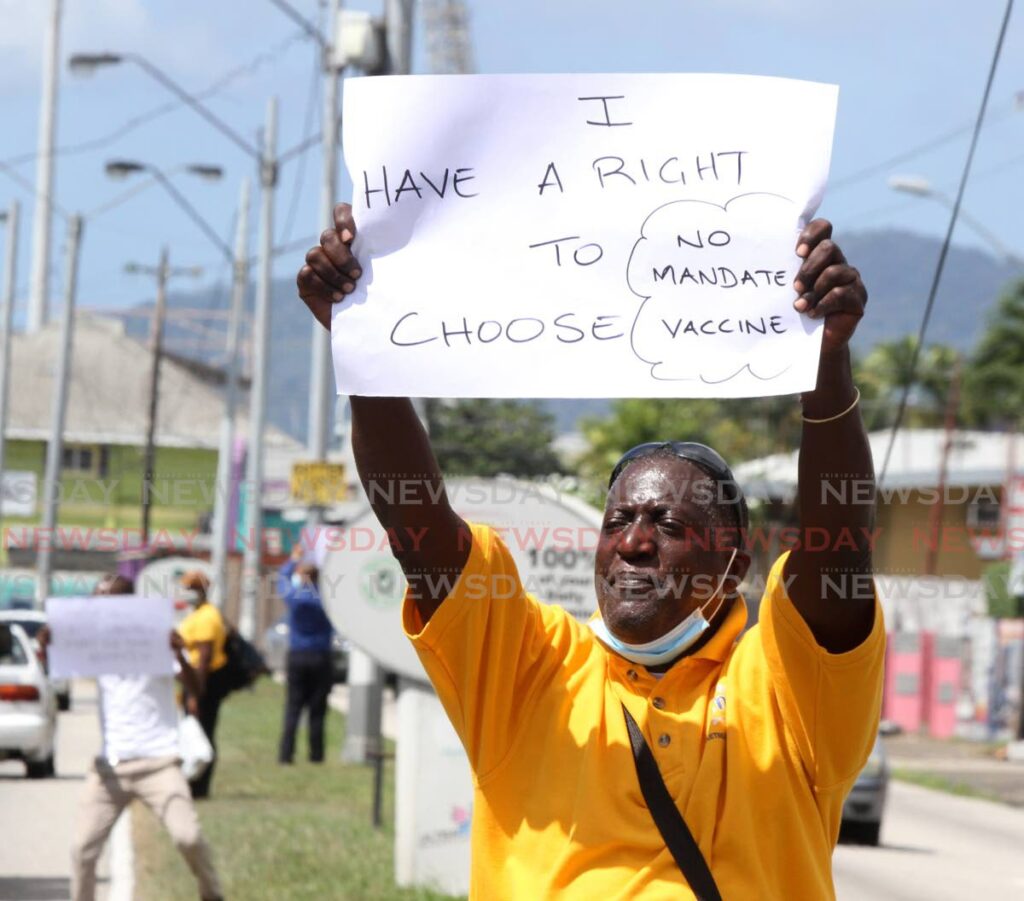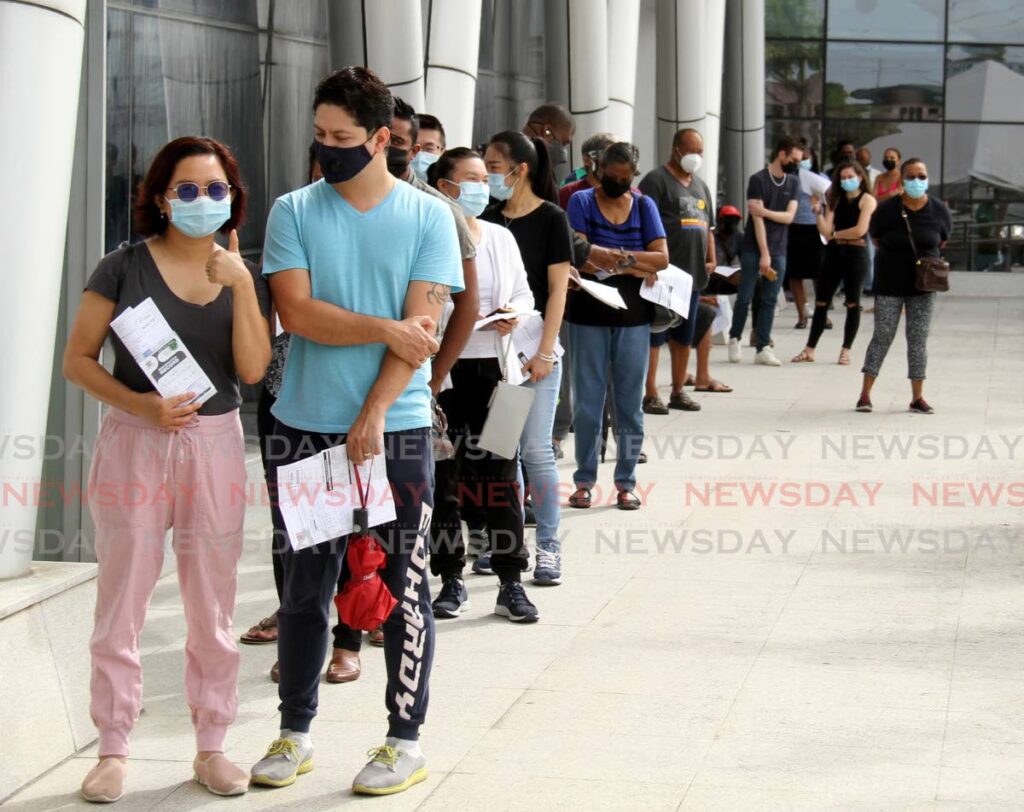Epidemiologist: Demystifying vaccines key to covid19 battle

When China shared covid19’s genetic sequence with the World Health Organization (WHO) on January 12, 2020, the information was disseminated and labs around the world quickly started work on potential vaccines.
But as epidemiologist Dr Farley Cleghorn explained to Newsday, scientists didn’t need much more information to start vaccine development.
Before covid19 was discovered, other coronaviruses already existed and work on mRNA technology – used to develop the Moderna and Pfizer vaccines – had been ongoing for over 20 years. The US government alone had already invested over US$12 billion in the technology’s development.
Now as TT’s vaccination rate creeps past 50 per cent – 50.4 per cent as of March 11, 2022 – since the national vaccination campaign started a year ago, Cleghorn said vaccine hesitancy must be combated with clear and concise communication.
After all, while it is important for people to scrutinise science and ask questions, Cleghorn said vaccine hesitancy comes down to a need for greater understanding, which requires a multifaceted public outreach approach.
He told Newsday, “I think in TT we’ve relied too much on the government standing up and giving information. If you do that every day, people stop listening. So the Prime Minister standing up, and the Chief Medical Officer standing up, and giving information loses its efficacy very quickly and we’ve had that for more than two years.
“It’s a standard communications 101 – different messages for different groups but they have to be internally consistent.”
Born in Trinidad, Cleghorn lives and practises medicine in the US. Trained in internal medicine and infectious diseases, he is the global head of health practice at Palladium. He has worked at the US National Institutes of Health at the National Cancer Institute, Johns Hopkins University and the University of Maryland Medical Center/Institute of Human Virology.
As vaccine hesitancy stalls TT’s vaccination programme, Cleghorn said the government must recognise the science behind covid19 vaccines is complex and not everyone will be able to digest the information.
When communicating with that segment of society, the message must be clear and concise: covid19 vaccines are safe, being used worldwide and have the benefit of reducing the probability of hospitalisation.
“When I say there’s a chunk of the population that will be able to respond to the scientific information, these are people who have an existing framework to incorporate that information.

“But there is a big chunk of people who can’t, and you have to find a different set of words to communicate the science.”
Using culture and the arts as an educational tool can also be effective in reaching groups like young people and senior citizens who may not be active on social media.
By doing this, Cleghorn said, TT’s vaccination campaign will be much more successful.
“Using a portfolio strategy is effective and applies to vaccines, as it does to all other prevention or mitigation measures.
“You have to have a portfolio strategy that says, I’m going to reach this group of people with these messages and I’m going to reach a next group of people with a next set of messages…and all of it must be co-ordinated.
“You really need a whole-of-society approach and government alone cannot do it.”
But, Cleghorn is predicting an uphill battle as the government rolls out boosters. With this in mind, a parallel campaign can be launched to educate people about the benefits.
For those concerned about the need for boosters, simply explaining that viruses and their vaccines are evolving will be a simple yet effective strategy.
One example is flu vaccines, given new ones are manufactured annually as different variants emerge.
“Every year when we have a new flu vaccine, it’s because there’s been recombination going on in live influenza viruses, which mean change is happening.
“So the old vaccines may not work against the new variants of the flu.”
Since covid19 vaccines were introduced to the public, Cleghorn said health experts have been transparent in saying they were unsure how long the vaccines would be effective.
Now, knowing the efficacy of vaccines is fairly short-lived, boosters will be necessary for the years to come.
Cleghorn couldn't predict how many will be needed and at what intervals they will be given, as scientists are still learning about the virus and vaccines.
“By giving boosters, you bring the immune response back up.
“However, boosters for the rest of our life is not a viable public health strategy. But at the moment that is the only strategy.”

While there is always room for vaccine mandates and restrictions like “safe zones” to get more people vaccinated, Cleghorn is calling on the authorities to thoroughly analyse the reasons people are vaccine-hesitant and strategically combat them, as mandates aren't an end-all approach.
“What are the messages that these folks are responding to? Are they hesitant because of social media, pre-existing health beliefs or misinformation? You have to try to understand it and I’m not so sure we have done that at all.”
If people are concerned about the speed at which the covid19 vaccines were developed, Cleghorn said more needs to be done to make them aware that covid19 isn’t the first coronavirus.
So vaccines against it aren't the first to be developed to fight these viruses.
“Keep in mind that coronaviruses have been around for a long time...we discovered coronaviruses in the 1960s.
“But the two we are most concerned with are SARs-CoV-1 and SARs-CoV-2, which have been discovered relatively recently.
“This is one of the reasons for the speed of coming up with vaccines for new coronaviruses.”
Since the early 2000s, scientists have been trying to find mRNA vaccines against the common cold, flu and other diseases. So the technology was around before covid19.
“MRNA technology says that if I know the sequence of the DNA or RNA of a virus, I can make a vaccine to that without having to go and grow the virus, which is what we had to do in the past.
“The technology met covid19 very early in the pandemic, which is how we have effective vaccines today.”
Apart from mRNA technology, covid19’s genetic sequence was also used to work on other types of vaccines like the Johnson & Johnson vaccine, which is a vector vaccine.
“Vector-based vaccines are those where you use a carrier virus to deliver some of the viral RNA.

- Photo by Angelo Marcelle
"Then you have inactivated vaccines, like Sinopharm and the Russian vaccine (Sputnik V).
“So investment went on in all different types of technology platforms to come up quickly with the most efficacious vaccines that we have.”
Cleghorn said people should be grateful that just a year into the pandemic, effective vaccines had been developed.
“Earlier on, it was all about access to those vaccines.
"Now it’s all about the uptake of those vaccines. Once the access issue is solved, and you have enough vaccines, then it’s all about uptake.
“Not only do you have to have the ability to increase uptake – because TT is stuck – but then you really have to work hard to find those platforms to reach more people.”
Cleghorn said the spread of misinformation on social media must also be addressed going forward.
He theorises another leading factor of vaccine hesitancy in TT is people’s unfamiliarity with stages-of-life vaccines.
“As you go through life, we have a huge number of vaccines – particularly as you get to over 65 – that are recommended by medical providers. For example, if you’re over 60, you should have gotten the shingles vaccine, a pneumococcal vaccine to prevent pneumonia, and the annual flu vaccine.”
He wants people to lean on their knowledge that many other places in the world, like TT, have relied on and mandated many vaccines, especially for childhood diseases.
“You have a series of immunisations that you get against significant childhood diseases, and you cannot enter a school without those vaccines.
“TT has many vaccines rules and regulations…you can’t even go to university without showing your vaccine card, and you certainly can’t travel without a yellow fever vaccine coming from TT, because the country has what you call endemic yellow fever.”
But ultimately, Cleghorn warns vaccination is just one part of the world’s response to managing and ultimately ending the pandemic.
People, including the vaccinated, must continue to understand the importance of individual risk-management approaches even in “safe zones” because people who are vaccinated can get and transmit covid19.
“A lot of people were mistakenly under the assumption that once we had a vaccine, everything was great, and they could take their mask off, go party and drop their guard. But that is just not the case.
“We need to be straight with people that vaccines alone are not the answer.
“Mitigation includes physical distancing, mask-wearing, reduction in gatherings and access to timely testing. When you put all those things together, including vaccination, that constitutes a response.”
So though there will be a high level of "covid19 fatigue," people must not drop their level of awareness. And even though health officials may not be able to give an exact day as to when the pandemic will end, Cleghorn said it is important that people be reassured it will, someday.
“It’s a reasonable thought to think vaccines and variants like omicron will take us out of the pandemic, but I think most health experts are afraid to put any time limits on this pandemic, given how it’s been going.
“You need a message that one day we’ll get out of this. But until we have real evidence that we are heading in that direction, we have to respond as we did day one of the pandemic, which is to protect lives and livelihoods.”
As long as people continue to ignore their individual risk management, the pandemic will be prolonged.
As human-wildlife interactions increase because of the earth’s increasing population and development – which lead to heavy reliance on animals for food and other services – Cleghorn said other viruses like covid19 will emerge. So the world must prepare to deal with such viruses.
“I think the breakdown in multilateral relations around this pandemic is something that we have to acknowledge and we have to deal with. Where we failed miserably in this pandemic is in the economic, political and social spheres, which is the realm of government and the realm of citizen engagement with government.
“In order to truly come out of this and plan for the future, we need a much stronger global commitment to preventing pandemics in the future and every country has to step up.”

Comments
"Epidemiologist: Demystifying vaccines key to covid19 battle"